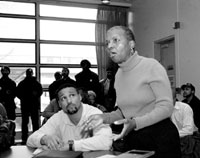
CHICAGO (FinalCall.com)–Any African leader who fights to distribute the wealth of the land to his people is considered a bad African leader by Western government, Zimbabwe’s UN Ambassador Bonaface Chidyausiku told a packed room of listeners at a Feb. 1 forum on “Land, Reparations and Pan-Africanism”.
But if that leader doesn’t touch the land distribution or wealth question, then he’s considered a good African leader, he said.
The United States and Britain demonize President Robert Mugabe because he wants to redistribute the land, Mr. Chidyausiku told the audience.
“You can’t pursue a program for sustainable development if people don’t own the land,” Mr. Chidyausiku said to applause. “Indigenous Zimbabweans must go into agribusiness, then we can claim to own what is ours, which is the economy,” and that is tied to the land, he said.
Amb. Chidyausiku, speaking at Kennedy-King College here, debunked the notion spread by the Western media that Zimbabwe is suffering from food shortages because of Pres. Mugabe’s controversial “one farm, one farmer” land redistribution program, noting that the region of Southern Africa has been under drought and neighboring Malawi, Mozambique and Zambia also face a food crisis.
More than 70 percent of the arable land in Zimbabwe has been in the hands of White farmers who colonized the land. Several years ago, Zimbabwe liberation war veterans began occupying land of White farmers, forcing the government to adopt a fast pace land resettlement plan.
“We aren’t going to turn the whole of Zimbabwe into small holdings,” the ambassador said, explaining the process that reallocates small, medium and commercial-sized farms to Blacks.
Invited to Chicago by Maurice and Rashieda Weaver of the Zimbabwe Support Committee, the panel included Min. Akbar Muhammad, Nation of Islam international representative; Attorney Demetrius Evans of the National Conference of Black Lawyers (NCBL); Rev. Al Sampson of Chicago; Dr. Conrad Worrill of the National Black United Front; Bob Brown, director of the Kwame Ture Institute and Dr. Anderson Thompson, among others.
Attorney Evans read from a NCBL statement in support of the “right of indigenous people to acquire the land” for the purpose of resettlement and other purposes essential to the exercise of self determination.
“The media’s treatment of President Mugabe appears remarkably similar to the treatment of Patrice Lumumba (of the Congo), Kwame Nkrumah (of Ghana) and other African leaders who sought genuine self-determination and were punished by Western powers,” she read.
Nevertheless, the attorney challenged the ambassador’s assertion that Black farmers were capable of successfully managing commercial-sized farms, and she questioned the legitimacy of Pres. Mugabe.
“If you aren’t prepared educationally, through trial and error, to go into a huge commercial farm and run it, then everyone will suffer. The process of giving back (land) can’t happen haphazardly,” she said.
“We must look very carefully at President Mugabe and we can’t be finagled into thinking that Black is always right,” she said, raising questions of alleged human rights abuses by the Zimbabwean government.
Min. Muhammad, who led a delegation of Black journalists, at the behest of Min. Louis Farrakhan, to Zimbabwe last year to report on the crises in that country, reminded Attorney Evans of the history of not only Zimbabwe, but the Black struggle for liberation.
“What is important is that it’s more than the land, it’s more than the transfer of the land, it’s that White folks–and I’m being brutally frank–determined that an African leader will not exist who wants to take land from White folks that they stole,” he said.
He noted that the 1979 Lancaster House agreement in Britain promised funds from the United States and Britain for the re-purchase of the land from White farmers. But the U.S. and Britain reneged on the agreement, he said.
Furthermore, the Zimbabwe government has waited patiently for 20 years for the redistribution of land without incident, he said.
America and Britain are saying that if Pres. Mugabe is successful with his land program, then it may become contagious and spread to Namibia and South Africa where most of the arable land is in the hands of White farmers, Min. Muhammad said.
“Why don’t we send a contingent of Black farmers in America who have lost their land to White folks to Zimbabwe. We know how to farm. Let us make the mistakes, but let’s not say we can’t do it without White folks,” he said.
Min. Akbar said Pres. Mugabe is getting the same treatment by the media that Saddam Hussein is getting in order to make world opinion against them.
Dr. Conrad Worrill reflected on the Zimbabwe delegation’s position at the UN Conference on Racism held in 2001 in Durban, South Africa. Zimbabwe was one of only a few countries in the Africa Group that stepped forward to support the language that slavery was a “crime against humanity” into the Durban Declaration.
He also announced a historic Feb. 26 federal court hearing in Chicago of the lawsuit for reparations from corporations that profited from slavery in the United States, the first such hearing of its kind.
Bob Brown argued that Black people wouldn’t be in America if it were not for the British government as leaders of the trans-Atlantic Slave Trade.
Zimbabwe, he said, is the highest expression of reparations “because they are taking the land.”
“It is the height of the diplomacy, patience, honesty and integrity that they waited this long,” he said.
Min. Muhammad announced a campaign by Zimbabwe support groups that will fill shipping containers with clothing and medicine to be shipped back to Zimbabwe. The first container was filled in St. Louis. He announced that a container would be placed on the grounds of Chicago’s Mosque Maryam later this month.












